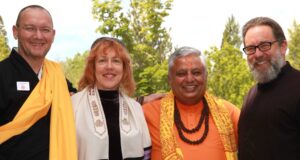In view of fast emerging Artificial Intelligence (AI) with the possibility of artificial sentience, the world needs to seriously and urgently address the ethical and moral issues surrounding it; a multi-faith coalition of Christian-Hindu-Buddhist-Jewish leaders warns.
Senior Episcopal priest in Connecticut Father Thomas W. Blake, Greek-Orthodox Christian clergyman in Nevada Father Stephen R. Karcher, Hindu statesman Rajan Zed, renowned Buddhist minister Reverend Matthew T. Fisher, esteemed Jewish rabbi in California-Nevada ElizaBeth Webb Beyer, well-respected Senior United Methodist Pastor Dawn M. Blundell; in a joint statement, said that AI should be used responsibly and religions should be involved and given active role in developing appropriate and adequate moral-ethical guardrails around it, before it changes our way of life.
Blake, Karcher, Zed, Fisher, Beyer, Blundell emphasize that since sentient machines are no longer unthinkable and there are claims of the possibility of developing sentient AI systems in the future; technologies seem to be venturing into God’s arena which can create serious spiritual implications. Tech should not be in the business of simply discarding overnight the thousands of years of wisdom of the texts.
Rajan Zed, who is President of Universal Society of Hinduism, points out that if machines become completely sentient having consciousness, it is a serious theological issue. An urgent and honest global conversation is needed (with religions as the major partner) before the self-aware machines become game changers and reshape humanity. Technology can be both a blessing and a burden, so we need to decide the right course of action before it is too late.
Future of mankind and human survival seem to be at stake with ever evolving AI generating deep societal repercussions and side effects. Heartless algorithms and mercantile greed should not be allowed to rule humanity. Public good needs to be promoted and protected and freedom and dignity of human beings need to be ensured; Zed indicates.
Religion and Tech should work together for advancing the public good and not shy away from each other. As AI seems to be replacing human judgment; we need to make sure AI should be harnessed for the common good. Parameters for ensuring accountability, incorruptibility, responsibility, safety from manipulation, transparency, etc., should be erected. We, the humans, need to have a better grip on where we are heading in this fast-developing superhuman intelligence, posing serious moral-ethical challenges and complications and sometimes causing unintended harm; Blake, Karcher, Zed, Fisher, Beyer, Blundell insist.
There might be a prospect in the future of some AI systems becoming contenders for a moral status, binding us morally to treat them appropriately and justly, as we are expected to treat each other. AI can be highly powerful—we just cannot leave it to the short-sighted interests of few people solely focused on maximizing profits and power and indulging in economic predation. We should make efforts to save the universe from dystopian consequences and Faustian outcomes; and we do not want AI to be another moral morass and the last invention of human beings; Blake, Karcher, Zed, Fisher, Beyer, Blundell note.
Rajan Zed further says that we welcome AI in making our lives better, but it is time to have some moral and ethical boundaries. Religion should be part of the conversation, however complicated it might be, as it would help Tech decide the right course of action and stay moral and ethical. Both Tech and religion need to learn to trust each other and collaborate, as reform is urgently needed. Morality should not be pushed to the back seat in AI development and meaningful moral-ethical guardrails should not be considered hurdles or limitations in profit-making. Moreover, moral-ethical systems should be an integral part of all AI development and not just window-dressing.
We would pray for the Tech world; these Christian, Hindu, Buddhist, Jewish leaders add.






